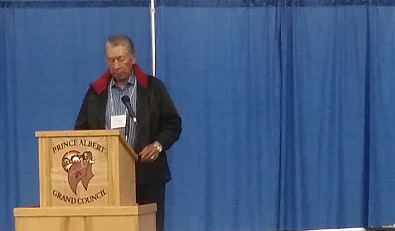Chief Brian Standingready. Photo by Chelsea Laskowski
A gaming forum in Prince Albert is building momentum on expanding First Nation jurisdiction in gaming.
There’s a sense of unrest with leadership at the First Nations Gaming Forum, coming from what leaders call unfairness in the provincial gaming framework agreement (GFA) that dates back more than 20 years.
It was put into place after White Bear First Nation opened the first-ever casino on reserve in Canada. Current White Bear Chief Brian Standingready told attendees at the forum that the initial goal for the First Nation was simple: to create jobs.
However, it was raided by the RCMP because at that time on-reserve casinos were prohibited by legislation.
“There was dogs and guns,” said Federation of Sovereign Indigenous Nations (FSIN) Vice-Chief Heather Bear.
“When you talk to some of the leadership, the ones that were there on the ground, it was very traumatizing for the community, of course, how they went in and destroyed what they built together as a community.”
White Bear stood firm in creating its own gaming laws and through court battles to see the Bear Claw Casino open as the first of Saskatchewan Indian Gaming Authority’s (SIGA) six casinos.
The 1993 incident triggered the jurisdiction issues that have persisted over the years, Bear said, and have come to the forefront in recent gaming forums. The first was in January in Swift Current.
The host tribal council’s Grand Chief Ron Michel said the province has been skimming from the profits of gaming when they had “absolutely no participation when gaming was started.”
FSIN Chief Bobby Cameron said his goal with renegotiations of the agreement is to take the money the province gets from SIGA from 25 per cent down to zero – something Cameron said he has previously told to Premier Brad Wall. He said it is unfair considering the provincial Crowns aren’t shared with First Nations.
Bear said no one should underestimate the ability of First Nations to govern their own gaming operations.
“We are moving in taking another step forward into establishing our own First Nations Auditor General for the purposes of accountability, transparency and trust in terms of gaming. So I’m very excited about that. How sophisticated can you get? And no other region in Canada is doing this,” Bear said.
She pointed out that FSIN has created structures that match up to the province’s governing of gaming, which would make it possible for FSIN to oversee a newly negotiated GFA.
“I would like to seek full control, a level field,” Bear said, referring to the transfers that saw more than $80 million flow from SIGA to the province last year.
The action plan for FSIN and its partners in the fight to gain jurisdiction over gaming is a complex one. If the province does not agree to a joint proposal with First Nations on gaming, Bear said they’ll need to go to the federal government on their own.
The Criminal Code of Canada delegates gaming from the federal government to the provinces, which needs to be amended, she said.
